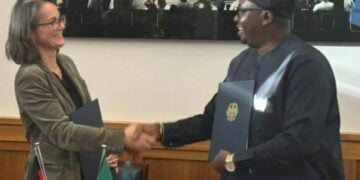BAT Nigeria has called for stronger public‑private partnerships to unlock clean‑energy investments and drive Africa’s inclusive energy transition.
The Company emphasised the critical role of the private sector in driving climate action and economic resilience across the continent.
Delivering a keynote address at the 2025 edition of the Private Sector ESG Forum, themed ‘Energy Security and Decarbonisation: Bridging the Gap for a Sustainable Future in Africa’, the managing director of BAT West & Central Africa, Yarub Al-Bahrani, highlighted the urgent need for businesses to adopt environmental stewardship
He noted that while Africa faces significant energy access challenges, the private sector must lead in decarbonisation and building sustainable energy systems for future generations.
Al-Bahrani outlined “BAT Nigeria’s progress in reducing its environmental footprint through measurable actions.
This includes transitioning 100 per cent of its operations from diesel to compressed natural gas (CNG), installing a 1.4 MW solar system at its Ibadan factory, and maintaining a zero-waste-to-landfill record since 2021. These initiatives, he said, are central to the Company’s target to achieve a 50 per cent reduction in Scope 1 and 2 greenhouse gas emissions by 2030.”
Reinforcing the importance of collaboration, Al-Bahrani called for stronger partnerships between the government, the private sector, and civil society to unlock investments in clean energy and accelerate Africa’s energy transition.
“Sustainability is not a corporate slogan; it is a collective responsibility. If we are to bridge the gap between energy security and decarbonisation, we must build together, through enabling policy, innovation, and shared commitment,” he stated.
This year’s Forum, held in partnership with TGI Group, BAT Nigeria, Stanbic IBTC and NESGAS Producing, featured two thought-provoking plenary sessions themed ‘From Production to Consumption: Building Resilient and Sustainable Energy Value Chains’, and ‘Financing Africa’s Energy Transition – Unlocking Capital for Gas and Renewables in a Balanced Energy Future’; deepening conversations on Africa’s energy future.
Participants at the Forum shared a unified perspective that Africa’s energy transition must be inclusive and innovative. Government, industry, and finance leaders agreed that expanding access to clean energy, strengthening policy coherence, and promoting sustainable financing are key to bridging the continent’s energy gap.





